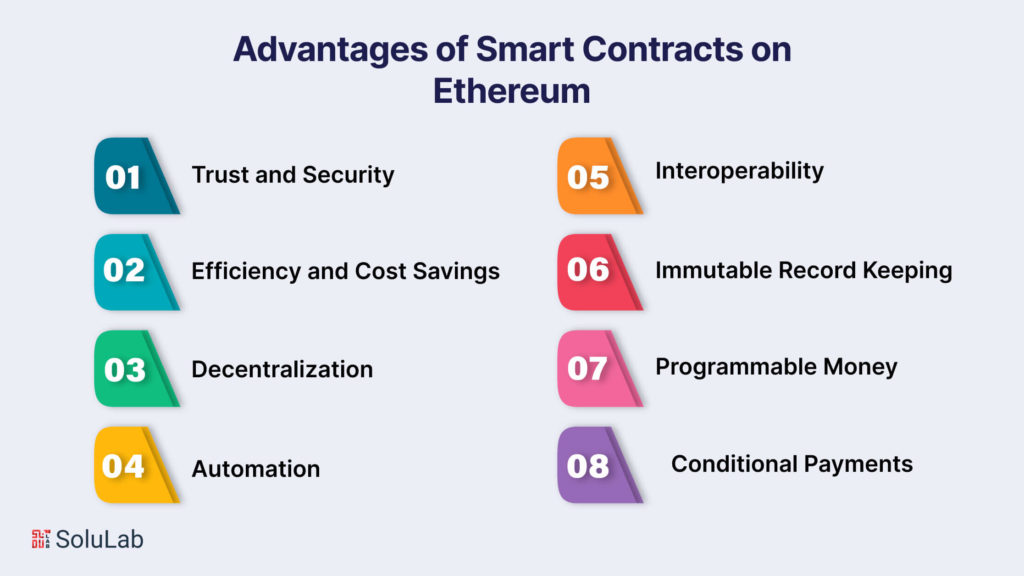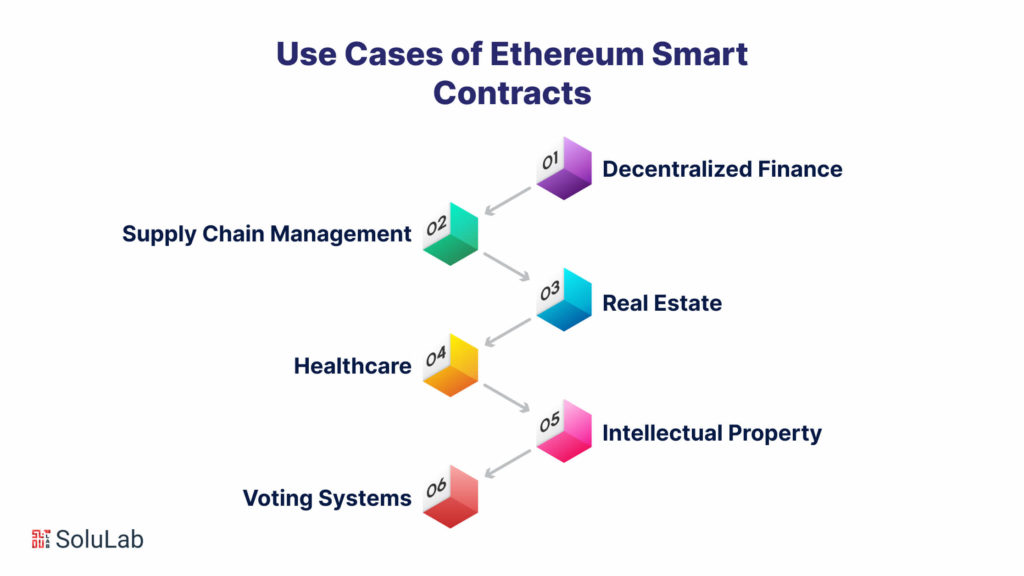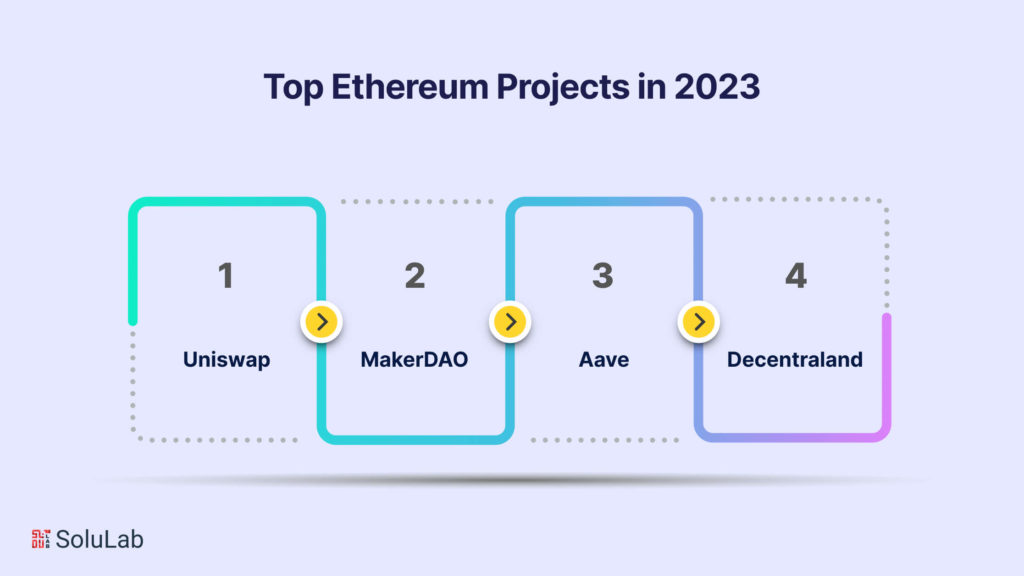
Have you ever wondered what would happen if the service or app you rely on suddenly disappeared? If that thought has crossed your mind, learning about Ethereum could be a game-changer. Ethereum is a platform for decentralized applications, meaning they don’t rely on a central server. At the heart of Ethereum’s success is its smart contract feature, revolutionizing how transactions take place on the blockchain. This article will take you into the world of Ethereum smart contracts, explaining how they work, their benefits and limitations, and showcasing real-world applications.
Understanding Ethereum
Vitalik Buterin created the Ethereum platform on blockchain technology, making it an open-source and decentralized ledger similar to Bitcoin. However, Ethereum aims to surpass the achievements of the original cryptocurrency.
Ethereum’s primary objective is to establish a network where diverse applications can be built on blockchain technology, with a special emphasis on serving as the foundation for creating smart contracts. Moreover, applications of ethereum smart contracts leverage the advantages of decentralization through the blockchain, forming a network of numerous nodes (miners) that share identical information and validate every transaction. This open-source data is immutable, meaning it cannot be altered, and it doesn’t require validation from public or private financial entities.
What are Smart Contracts?
Smart contracts are programs that run on the blockchain to execute transactions automatically when specific conditions are met. The idea of a “smart contract” was first discussed in 1993 by computer scientist Nick Szabo. He compared it to a digital vending machine where users put in $1 and get a snack or drink. Similarly, a smart contract works when you put in something (like 10 ether on Ethereum) and expect a certain outcome (like the money being available after a specific date).
In our online lives, many things involve middlemen. Even just sharing a cat photo online usually needs a service like Facebook or Twitter, which not only runs the network but also sets and enforces the rules. Smart contracts change this by letting us automate these digital tasks without relying on a central authority. Blockchains, a group of computers working together, make smart contracts possible. They enforce rules on the network without needing a middleman.
Smart contracts use code to automatically enforce rules without courts or any third party. There are already hundreds of apps using smart contracts.
For example, popular Ethereum apps like MakerDAO and Compound rely on smart contracts for lending and letting users earn interest.
Advantages of Smart Contracts on Ethereum

1. Trust and Security
Smart contracts executed on the Ethereum blockchain enhance trust and security by eliminating the reliance on trust between parties. Traditional agreements often involve trust in a central authority, introducing the risk of manipulation or fraud. With smart contract Ethereum, the transparent and immutable nature of the blockchain ensures that all involved parties have access to the same information. This transparency significantly reduces the potential for fraud, as the terms and execution of the contract are verifiable by all participants.
2. Efficiency and Cost Savings
Ethereum smart contracts bring notable efficiency gains and cost savings by removing intermediaries from the equation. In conventional transactions, intermediaries, such as banks or legal entities, play a role in verifying and facilitating agreements. This process incurs additional time and costs. In contrast, Ethereum smart contracts automate and streamline the entire process, cutting out intermediaries. As a result, transactions become faster, more direct, and cost-effective.
3. Decentralization
The decentralized nature of Ethereum’s network is a fundamental advantage for smart contracts. Unlike centralized systems where control rests with a single entity, Ethereum operates on a decentralized network of nodes. This decentralization ensures that no single entity has control over smart contracts, making them resilient to censorship, manipulation, or single points of failure. It enhances the overall reliability and trustworthiness of the smart contract ecosystem.
4. Automation
Ethereum smart contracts introduce automation into the execution of agreements, reducing the need for manual intervention. In traditional contracts, many steps require human verification and validation, leading to potential errors. Smart contracts, once deployed, automatically execute predefined actions when conditions are met. This automation not only accelerates the entire process but also minimizes the risk of human errors, enhancing the accuracy and reliability of contract execution.
5. Interoperability
Ethereum’s open-source nature fosters interoperability with other blockchain platforms. Smart contracts on Ethereum can interact with those on other compatible blockchains, creating a seamless flow of data and value. This interoperability opens up new possibilities for complex business scenarios and collaborations, allowing for a more interconnected and efficient global financial ecosystem.
6. Immutable Record Keeping
The data recorded on the blockchain Etheruem smart contract is immutable, meaning it cannot be altered or tampered with. This feature ensures a secure and transparent record of all executed smart contracts. Immutability is particularly crucial for maintaining an accurate and reliable historical record, which is valuable for smart contract audit, compliance, and dispute resolution purposes.
7. Programmable Money
Ethereum’s smart contracts enable the creation of programmable money. This means that the rules governing the transfer and use of funds can be encoded directly into the smart contract. For instance, a smart contract could automatically distribute funds among team members based on predefined criteria or trigger payments upon the completion of specific milestones. This programmability adds a new layer of flexibility and efficiency to financial transactions.
8. Conditional Payments
Ethereum smart contracts allow for conditional payments based on predefined criteria. For example, funds could be released to a seller only upon the successful delivery of goods or services, as verified by an external source or an oracle. This feature adds an extra layer of security and trust, ensuring that payments are made only when the agreed-upon conditions are met, reducing the potential for disputes.
Why Choose Ethereum Smart Contracts?
Bitcoin, the pioneer of cryptocurrencies, introduced basic smart contracts, but Ethereum takes it to the next level. Unlike Bitcoin’s limited smart contracts, Ethereum’s transactions are smart contracts in themselves. The network approves transactions only when specific conditions are met—like providing a digital signature proving ownership of the claimed cryptocurrency through a private key.
Ethereum’s advantage lies in its flexible language, which goes beyond basic cryptocurrency transactions. It uses a “Turing-complete” language, allowing developers to implement a wide range of computational instructions. With this freedom, programmers can create almost any smart contract they envision.
How Does the Smart Contract Work on Ethereum?
A developer writes smart contract code in a language like Solidity and deploys it to the Ethereum network. The code includes all the terms, conditions, participants, and outputs of the agreement. Once deployed, a smart contract is assigned a unique address on the blockchain where it resides immutably.
When predetermined conditions coded into the smart contract are triggered, the software auto-executes the corresponding contractual clauses.
For example, a smart contract could automatically release insurance payouts if flight records show a delay of over 4 hours. The transparency of all interactions with the contract builds trust between participants.
The software powering smart contracts’ deterministic functionality is the Ethereum Virtual Machine (EVM). The EVM runs on every computer (node) in the decentralized Ethereum network and enables seamless peer-to-peer smart contract evaluation and execution.
Here is the step-by-step process to:
- A user sends a transaction to execute a function in the smart contract code. This could be making a payment, triggering a release of digital assets, or anything else outlined in the code.
- Miners bundle transactions into blocks and use an incentive structure called Gas to prioritize executing smart contracts with higher fees.
- A miner solves the block and broadcasts it to the network. All nodes then run the smart contract code through the EVM in parallel to validate the execution.
- Updated contract data is stored on the new block across nodes. The network reaches a consensus on the final output and the latest state of the smart contract.
- The function executes, and all participants can verify and view the transparent result in the distributed public ledger.
Ethereum Smart Contracts: Use Cases

Smart contracts, a revolutionary feature of the Ethereum blockchain, have transcended their initial concept and found practical utility in a multitude of industries. Their versatility is reshaping the landscape of decentralized applications, bringing efficiency, transparency, and security to various processes. Let’s delve into some compelling real-life examples across different sectors:
1. Decentralized Finance (DeFi): Transforming Financial Services
At the forefront of Ethereum’s smart contract applications lies the decentralized finance (DeFi) sector. These self-executing contracts enable a plethora of financial services, from lending and borrowing to decentralized exchanges.
For example, consider a decentralized finance lending platform powered by smart contracts. Users can securely borrow funds without relying on traditional financial intermediaries, streamlining the lending process and reducing associated costs.
2. Supply Chain Management: More Transparency
Smart contracts are making significant strides in revolutionizing supply chain management. By automating processes such as inventory management and product tracking, they enhance transparency and traceability. It helps to automatically update inventory levels and authenticate product movements. This not only minimizes errors but also mitigates the risk of fraud, ensuring a more secure and efficient supply chain ecosystem.
3. Real Estate: Streamlining Property Transactions
Smart contracts are streamlining traditionally complex processes in real estate. They facilitate secure property transfers, automate rental agreements, and maintain transparent property ownership records. It helps to manage the entire process, ensuring seamless and secure transfers of property ownership. This not only reduces the need for intermediaries but also expedites the often lengthy real estate transactions.
4. Healthcare: Securing Medical Records and Insurance Claims
In the healthcare sector, the security and accuracy of medical records and insurance claims are paramount. Smart contracts provide a robust solution by ensuring the privacy and accuracy of sensitive data. The decentralized and tamper-resistant nature of the blockchain ensures that medical records are securely stored, and insurance claims are processed efficiently, minimizing errors and enhancing data integrity.
5. Intellectual Property: Protecting Creativity
Smart contracts are increasingly finding applications in protecting intellectual property rights. Artists, writers, and creators can utilize smart contracts to establish ownership and manage royalties for their work. For example, a musician could deploy a smart contract to automatically distribute royalties to collaborators based on predefined criteria, ensuring a fair and transparent compensation structure.
6. Voting Systems: Ensuring Transparency in Elections
The transparency and immutability of blockchain make smart contracts an ideal candidate for revolutionizing voting systems. Implementing smart contracts in elections can enhance transparency, eliminate fraud, and ensure the integrity of the electoral process. Imagine a scenario where citizens cast their votes through a secure and transparent blockchain-based system, with smart contracts automatically tallying and verifying the results in real time.
Companies Using Ethereum Smart Contract
Many companies are using smart contracts Ethereum to make their business processes secure and efficient. Here are a few examples:
1. Microsoft: Microsoft uses Ethereum smart contracts to ensure the security and transparency of its product supply chain.
2. JPMorgan Chase: JPMorgan Chase employs Ethereum smart contracts to enhance the efficiency and security of its international payments.
3. Accenture: Accenture utilizes Ethereum smart contracts to offer secure and transparent solutions for its clients’ supply chains.
As technology evolves, more companies are likely to adopt blockchain solutions for their business benefits.
Top Ethereum Projects in 2023

-
Uniswap
Uniswap stands out as a decentralized exchange (DEX) on the Ethereum blockchain, eliminating the need for intermediaries or traditional order books. Through smart contracts and automated market-making (AMM), users can seamlessly trade cryptocurrencies directly from their digital wallets and participate in providing liquidity for various DeFi protocols.
-
MakerDAO
Operating on the Ethereum blockchain, MakerDAO governs the stablecoin DAI, pegged to the US dollar through over-collateralized loans. Users can secure DAI by locking up Ethereum as collateral, contributing to the stability of the decentralized finance (DeFi) ecosystem.
-
Aave
Aave facilitates lending, borrowing, and earning interest on cryptocurrencies without intermediaries. Notably, Aave’s “flash loan” feature enables instant borrowing and repayment in a single transaction, fostering innovation in DeFi applications.
-
Decentraland
Decentraland is a virtual reality platform built on Ethereum, empowering users to create, own, and monetize digital assets and experiences. This decentralized metaverse allows users to explore, interact, and trade within a vast, user-generated 3D virtual world.
Challenges and Limitations
Ethereum, with its revolutionary smart contract capabilities, has undeniably transformed the landscape of decentralized applications (DApps) and blockchain-based solutions. However, the platform is not immune to certain limitations that warrant careful consideration.
-
Immutability and Security
Once a smart contract is on the blockchain, its code can’t change. This is good for security, but if there’s a mistake or problem later, fixing it becomes tricky.
-
Scalability Issues
Ethereum got so popular that handling a lot of transactions at once became tough. This leads to slow transactions and higher fees. This makes it hard for more people and apps to use Ethereum at the same time. Ethereum 2.0 is trying to fix this by using a new method, but it’s not fully ready yet.
-
Dependency on Oracles
Smart contracts often need real-world info, like stock prices. Oracles help by connecting the blockchain to this info. But relying too much on oracles can be risky. If oracles aren’t secure, bad actors could mess with smart contracts. This makes it important to choose good oracles to keep the system safe.
-
Additional Limitations: Complexity, Gas Costs, and Interoperability
Beyond the three highlighted limitations, Ethereum smart contracts face other challenges worth mentioning. The complexity of developing and auditing smart contracts requires a high level of expertise, making it a daunting task for less experienced developers. Gas costs, the fees associated with executing transactions on the Ethereum network, can be unpredictable and expensive, affecting the economic feasibility of certain applications.
Interoperability, or the ability of Ethereum to seamlessly interact with other blockchains, is an ongoing concern. As the blockchain ecosystem evolves, achieving interoperability becomes crucial for the broader adoption and integration of blockchain technologies into various industries.
Take Away
Ethereum is the preferred platform for innovation in the blockchain and cryptocurrency realm. Its flexibility and strength continually give rise to new applications, and future improvements in scalability will further fuel development. Whether it’s the evolution of DAOs, the integration of Enterprise Ethereum, or the growth of DeFi, the future of Ethereum appears to be more thrilling than ever. Overall, Ethereum’s potential to transform transactions with its ongoing advancements positions it as a key player in shaping the future landscape of digital interactions.
It is not rocket science to create an Ethereum smart contract, especially with Solulab as your guide. Solulab is a top-notch blockchain development company, excelling in Ethereum-based smart contracts. Known for their expertise and innovation, Solulab is the ideal partner for businesses exploring decentralized applications. Specializing in Ethereum smart contract development, Solulab tailors solutions to maximize blockchain technology. With a commitment to excellence, Solulab is a reliable choice for companies looking to harness the potential of Ethereum smart contracts. Get in touch today!
FAQs
1. What is an Ethereum Smart Contract?
An Ethereum smart contract is like a computer program that lives on the blockchain at a specific address called a contract address. These contracts are applications to perform certain functions, change their status, and make transactions. The Ethereum Virtual Machine (EVM) compiles the code into bytecode and runs on the blockchain.
2. What is an Ethereum Account?
Ethereum accounts have two categories: Externally Owned Accounts (EOA) and Contract Accounts. An EOA is like a regular account controlled by a private key and can send transactions. A Contract Account has code associated with it, and it executes when it receives a transaction from an EOA. However, it is impossible for an account to initiate transactions on its own; they must always come from an EOA.
3. What is an Ethereum Transaction?
An Ethereum transaction is a signed message that one account sends to another. It includes sender and recipient information, the amount of Ether to transfer, the smart contract code, and the transaction fee (gas price and limit) the sender pays to execute the transaction.
4. How Can I Pay for Transactions on Ethereum?
You pay for transactions using Ether. Ether has two purposes: preventing network congestion and working as an incentive for users to validate transactions (mining). Each transaction has a cost measured in gas fees paid in Ether. One Ether is a lot of smaller units called gwei, and 1 Ether equals 1,000,000,000 gwei (10^9).
5. How Does Ethereum Work for Applications?
When a transaction goes on contract, all nodes in the network execute every instruction. Ethereum uses the Ethereum Virtual Machine (EVM) to ensure that all nodes follow the same steps to keep their ledgers in sync. Each transaction has a gas limit and fee.
6. What Does Signing a Transaction Mean?
Signing a transaction means creating a signature using the sender’s private key. Transactions are signed before being sent to the network for processing.
7. What is a Hard Fork in Ethereum?
A hard fork is a modification done on the Ethereum protocol to create new rules. All Ethereum clients need to upgrade; otherwise, they remain working on an incompatible chain following the old rules.
8. What is Gas in Ethereum Transactions?
Gas in Ethereum refers to the computational cost required to execute operations or run smart contracts on the Ethereum network. Each operation or instruction in a smart contract consumes a certain amount of gas, and the total gas cost determines the transaction fee. Gas acts as a measure of computational effort, and users must specify a gas limit and gas price when initiating a transaction. If the gas limit is too low, the transaction may run out of gas, and any changes made during execution are reverted.
9. How is Ethereum Different from Bitcoin?
While both Ethereum and Bitcoin are cryptocurrencies, they serve different purposes. Bitcoin primarily functions as a digital currency for peer-to-peer transactions and stores of value, while Ethereum is a decentralized platform enabling the creation and execution of smart contracts. Ethereum’s blockchain supports more complex transactions and decentralized applications (DApps) beyond simple monetary transfers, making it a versatile platform for a wide range of decentralized services.





